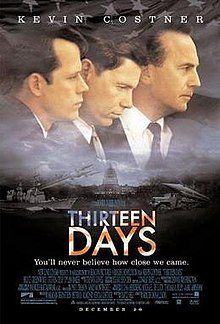Thirteen Days (film)
| Thirteen Days | |
|---|---|

Theatrical release poster
|
|
| Directed by | Roger Donaldson |
| Produced by | |
| Written by | David Self |
| Based on |
The Kennedy Tapes: Inside the White House During the Cuban Missile Crisis by Ernest May and Philip Zelikow |
| Starring | Kevin Costner |
| Music by | Trevor Jones |
| Cinematography | Roger Deakins |
| Edited by | Conrad Buff |
|
Production
company |
|
| Distributed by | New Line Cinema |
|
Release date
|
|
|
Running time
|
145 minutes |
| Country | United States |
| Language | English |
| Budget | $80 million |
| Box office | $66.6 million |
Thirteen Days is a 2000 American historical political thriller film directed by Roger Donaldson, dramatizing the Cuban Missile Crisis of 1962, seen from the perspective of the US political leadership. Kevin Costner stars as political consultant Kenneth P. O'Donnell, with Bruce Greenwood featured as President John F. Kennedy, Steven Culp as Attorney General Robert F. Kennedy, and Dylan Baker as Secretary of Defense Robert McNamara.
While the film carries the same title as the book Thirteen Days by former Attorney General Robert F. Kennedy, it is in fact based on a different book, The Kennedy Tapes: Inside the White House During the Cuban Missile Crisis, by Ernest May and Philip Zelikow. It is the second docudrama made about the crisis, the first being 1974's The Missiles of October, which was based on Kennedy's book. The 2000 film contains some newly declassified information not available to the earlier production, but takes greater dramatic license, particularly in its choice of O'Donnell as protagonist.
In October 1962, U-2 aerial surveillance photos reveal that the Soviet Union is in the process of placing intermediate-range ballistic missiles carrying nuclear weapons in Cuba. President John F. Kennedy (Bruce Greenwood) and his advisers must come up with a plan of action to prevent their activation. Kennedy is determined to show that the United States will not allow a missile threat. The Joint Chiefs of Staff advise immediate U.S. military strikes against the missile sites followed by an invasion of Cuba. However, Kennedy is reluctant to attack and invade because it would very likely cause the Soviets to invade Berlin, which could lead to an all-out war. Citing The Guns of August, Kennedy sees an analogy to the events that started World War I, where the tactics of both sides' commanders had not evolved since the previous war and were obsolete, only this time nuclear weapons are involved. War appears to be almost inevitable.
...
Wikipedia
